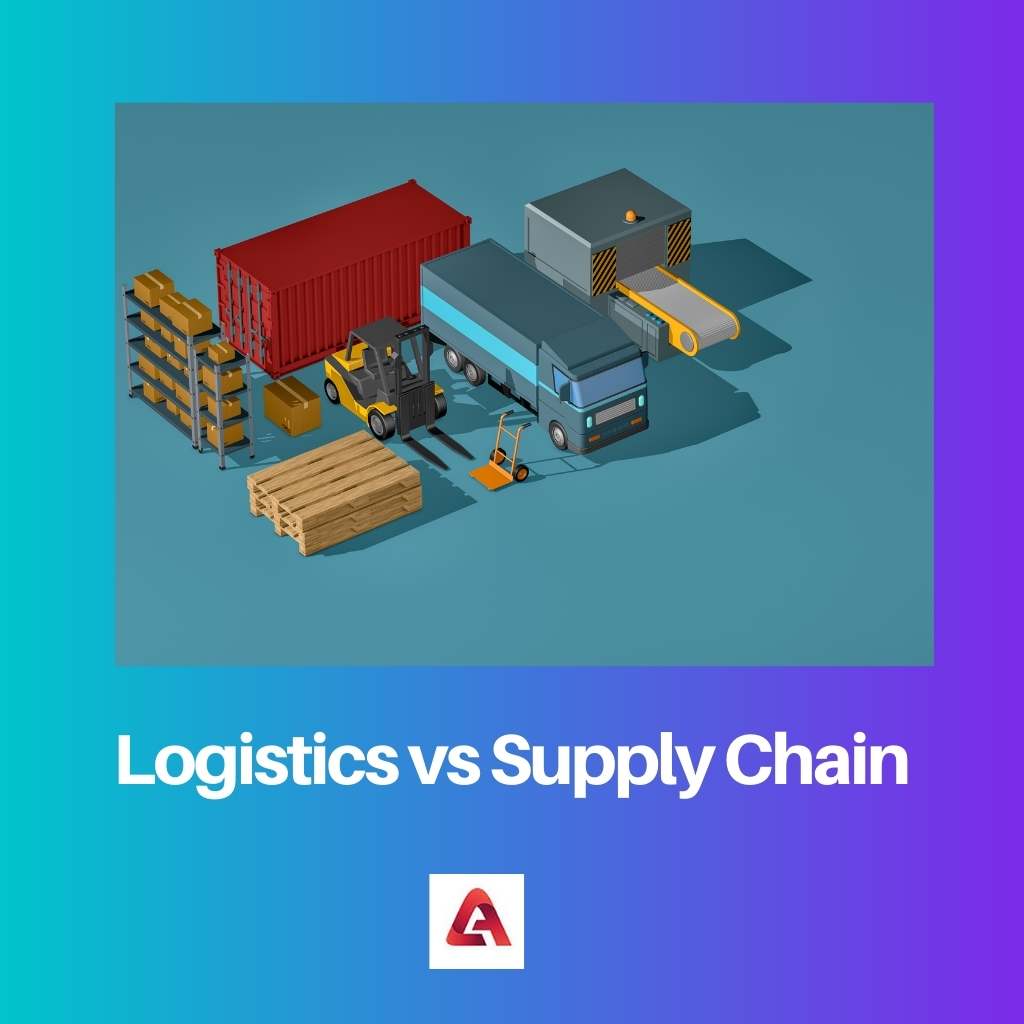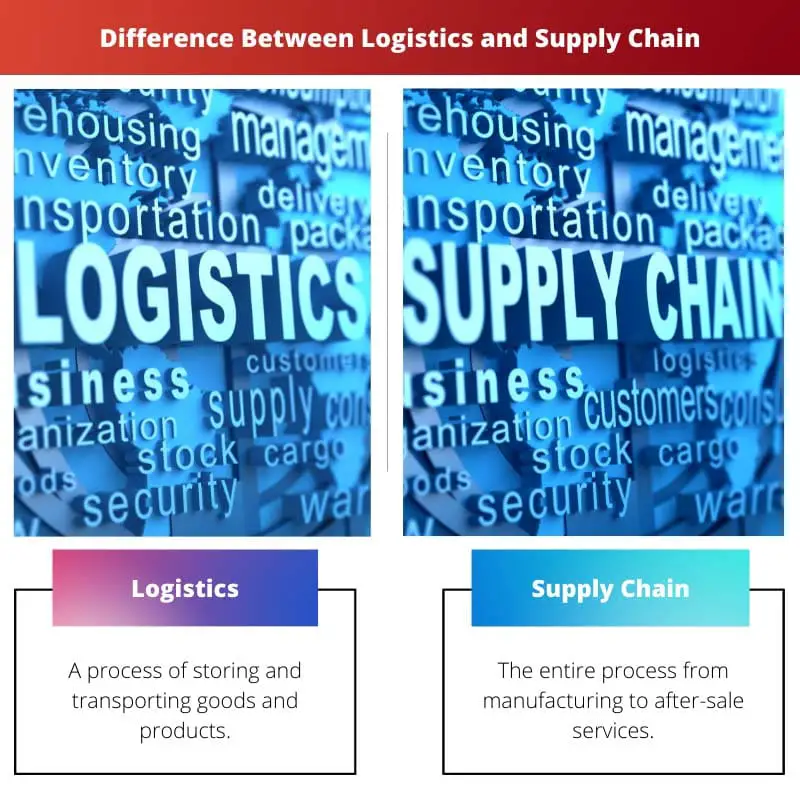Big organizations manage their businesses carefully to make a profit. From manufacturing goods to transporting them and delivering them safely at the right time can be a tricky task to manage.
Key Takeaways
- Logistics is the management of the transportation and storage of goods, while supply chain management encompasses the entire process of producing and delivering products.
- Supply chain management includes procurement, production, storage, and transportation, whereas logistics focuses on the efficient movement and storage of products.
- Effective logistics management can optimize a supply chain by reducing costs, ensuring timely deliveries, and improving customer satisfaction.
Logistics vs Supply Chain
Logistics is the process of acquiring, transporting, and storing resources, as well as managing the resources from the supplier to the customer. Supply chain means the entire process involved in the manufacturing and selling of consumer products, from the making of the product to when the customer gets it.

Logistics was the only management used decades back, but now it has been replaced by the supply chain. Logistics is now a part of the supply chain.
A supply Chain is defined as the network between a company and its suppliers to manufacture and deliver a specific product or service in time. It manages all the processes starting from raw materials to delivering the product.
Comparison Table
| Parameters of Comparison | Logistics | Supply Chain |
|---|---|---|
| Definition | A process of storing and transporting goods and products. | The entire process, from manufacturing to after-sale services. |
| Work | Planning and implementation of a business or operation, etc. | Procurement, manufacturing, supply and demand planning, etc. |
| Objective | Customer Satisfaction. | Competitive Advantage. |
| Evolution | It is an outdated concept to handle multiple organizations solely. | It is a modern concept that has replaced logistics. |
| Interdependency | Works independently. | Supply Chain partially depends on Logistics. |
What is Logistics?
Logistics is one of the primary objectives of the supply chain. It is defined as the management, including the processes of acquiring, transporting, and storing resources from manufacturers to customers.
The officers who were responsible for ensuring the supply and allocation of resources were called ‘Logistikas’. With the industrial revolution after World War 2, logistics advanced vastly with the introduction of technology.
It plays a huge role in its organisation’s overall reputation and future scope. There are five logistics elements, including storage, packaging, inventory, transport, and control.
Ever since the emergence of new companies, the manufacturing rate, complexity, infrastructure, investment, etc., have increased, and as a result, managing all the work is also a vast operation.

What is Supply Chain?
The supply chain is defined as the entire process of manufacturing and selling commercial products, including every step, from the supply of resources and the manufacture of the products to their delivery to the customer.
The major objective of the supply chain is to gain a competitive advantage in the business. For example, suppose a product of some company is well made. In that case, it is delivered to the customer in time, and the company offers excellent services regarding the product to its customer. The customer is likely to invest in the company’s products again.
Every stage of a supply chain is essentially an industry by itself. If there is a disturbance in any activity of any stage, the whole supply chain is delayed, and the company suffers considerable losses.

Main Differences Between Logistics and Supply Chain
- The fundamental concept of logistics has already evolved, whereas the supply chain is modern and considered the new version of logistics.
- Logistics is a narrower concept associated with only maintenance and storage, whereas supply chain is a broader concept which refers to the connection of manufacturers with the consumer.


The supply chain’s interdependency across various stages highlights the critical role of logistics in ensuring an efficient and effective supply chain. This interconnectedness emphasizes the need for seamless coordination across all activities.
The relationship between logistics and supply chain management underlines the need for strategic alignment to optimize operations and enhance customer satisfaction.
Absolutely. The interdependency of logistics and supply chain is integral to the successful management of resources and delivery of products.
Both logistics and supply chain management play significant roles in ensuring customer satisfaction and maintaining competitive advantage. Understanding these functions is vital for effective business planning and implementation.
Absolutely. The shift from logistics to supply chain management reflects the evolution of business practices and the emphasis on comprehensive management of resources.
The expansion of supply chain management to include procurement, manufacturing, and inventory illustrates its comprehensive approach to handling resources. It’s fascinating to see how businesses have adapted to the modern concept of supply chain.
Logistics was once the primary focus of managing goods and products, but the emergence of supply chain management revolutionized business operations. It’s essential for companies to adapt to the changing landscape for efficient operations.
The supply chain is crucial for businesses and helps maintain the reputation of the organisation. A well-managed supply chain can lead to gaining a competitive advantage. Both logistics and supply chain management are essential for a robust business strategy.
I completely agree. Businesses must understand the importance and impact of both logistics and supply chain on their operations.
The emphasis on technological advancements in logistics highlights its evolution over the years. The integration of technology has significantly enhanced the management of resources and the transportation of goods.
Indeed. The utilization of technology has transformed logistics and supply chain management, leading to greater efficiency and effectiveness in business operations.
The comparison table illustrates the distinct differences between logistics and supply chain. This highlights the shift from traditional logistics to the more comprehensive supply chain management.
The concept of supply chain being an entire process, from manufacturing to after-sale services, emphasizes the comprehensive nature of supply chain management. It encompasses all stages involved in delivering the product to the customer.
Correct. An effective supply chain requires coordination across all stages to ensure timely delivery and consistent quality of products.
It’s intriguing to see how the supply chain has evolved, reflecting the changing dynamics of the business environment.